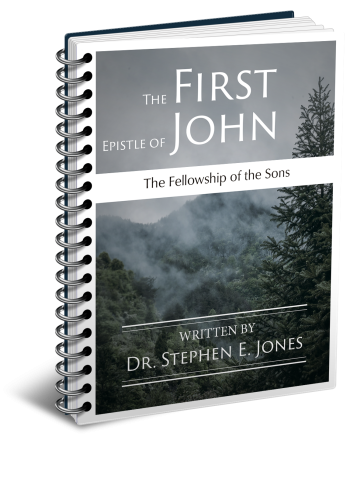Latest Posts
View the latest posts in an easy-to-read list format, with filtering options.

An in-depth commentary of the first epistle of John in the Bible.
Category - Bible Commentaries

Some men’s belief systems are based upon truth, and others on experience. Both are equally vital, but some are unbalanced one way or the other. If truth has no experience, it is useless, even as faith without works is dead. Likewise, if experience has no truth, it has no foundation, but is like an explosion of energy without direction.
John says that the Word is light, and it is self-evident that if that Word is not truth, then its expression cannot give forth any light. Light is the truth of the Word. Yet it stands to reason that when God said, “Let there be light” (Gen. 1:3), the evidence of His speaking lay in the fact that light actually appeared in the physivcal universe. This was something God Himself experienced and witnessed, since no man had yet been created. But as time passed, everyone who was of the truth could have his or her part in the expression of the Word of Truth and be able to see the evidence of light in the hearts of those who hear.
Ultimately, this light causes people to come out of darkness. In other words, they come to know God, agree with Him, put on His mind, and begin to conform to His image—the same image in which man was created at the beginning (Gen. 1:26), which was intended to reflect the glory of God. Those who walk in the light become the light, and they no longer walk in darkness. They have discovered their purpose in life and the reason they were created on earth. They begin to find the answer to the age-old questions: Where did I come from? Why am I here? Where am I going?
The answers to these fundamental questions are in the light, which comes by the spoken Word from Christ, who is the Word of God and the visible expression of the Word that begat light.
The apostle continues in 1 John 2:12, saying,
12 I am writing to you, little children, because your sins are forgiven you for His name’s sake.
Here John gives us the third reason for writing his epistle: “because your sins are forgiven you.” Even though believers still need an Advocate when they sin, their sins have already been expiated.
John speaks the Word (light) to “little children” in preparation for a word to “fathers” in the next verses. He uses the Greek word teknion, which literally means “an infant,” yet teachers in those days often used the word to refer affectionately to their disciples. Essentially, it referred to those who were yet minors, dependent upon parents, teachers, or guardians.
Even a newborn believer was already “forgiven.” That is the message which even many theologians over the centuries have not been able to comprehend. The good news is that we receive forgiveness of sins at the beginning of our journey, not merely at the end. Another way of putting this is to say that we have been imputed righteous. Though we are yet children, often unruly and lacking understanding of the deep things of God, He has chosen to call what is not as though it were (Rom. 4:17, KJV).
As children, we are not yet mature in our understanding, nor are our works in perfect alignment with the works of Christ. We still fall short in many ways. However, we are forgiven, even as He disciplines us. His fatherly discipline, regardless of how severe it may seem to the children, is administered from a heart of love and is designed to bring us to maturity. Such discipline is often perceived by the children as a lack of love and forgiveness, but these are misperceptions imposed upon us by our own immaturity and (unfortunately) often by our teachers’ own inner darkness.
The law of God teaches us that there are two steps toward dealing with sin. It is found in the law regarding the Day of Atonement in Leviticus 16. There we read that the solution to sin requires two goats, not just one. The first was to be killed and its blood sprinkled upon the mercy seat within the Most Holy Place (Lev. 16:15). The blood of this goat covered sin. The Hebrew word is kaphar, “to cover, atone for;” hence, it was done on the Day of Atonement (Yom Kippur).
But covering sin is only the start. To cover sin gives the appearance of cleanness, but in fact, the sin must ultimately be removed in order to complete the process. The second goat was not killed, but was sent into the wilderness to remove sin (Lev. 16:21, 22).
So Christ came first to die on the cross to cover sin, but He must come a second time to remove sin. Actually, He will remove iniquity from our hearts. Iniquity is the root condition which causes us to sin. By the power of the first goat (Christ), John tells his “little children,” your sins are forgiven, though iniquity has not yet been removed by the second goat (Christ in His second appearance).
So John assures his “little children” that they need not wallow around in perpetual guilt, even though they fall short of the glory of God. Jesus came as the first goat to cover their sin, so that in the eyes of the law, they are already perfect. This is the up-front gift of God that is bestowed upon a heart of faith, because their faith is in Jesus Christ, who died to pay the penalty for sin that was demanded by the law.
There are many believers who do not know that their sins are forgiven. They have been taught that no one can know that they are “saved” until their life is over and they reach the other side. Many go through life without this assurance of forgiveness, and this fear keeps them in bondage. They have been taught by their “fathers” that they are not forgiven (saved) until they are fully mature and no longer sin.
In my experience, this problem of perpetual guilt and fear is most prevalent in those who were raised Roman Catholic. Even if they leave that church (denomination), the guilt and fear often remain until they receive the light of truth. Many have been embittered by their belief that God does not truly forgive. Some are crushed in spirit, while others rebel and go into witchcraft, for if they cannot find forgiveness, they can at least embark on a search for power in this life. These children need to hear the word of truth and light from the apostle John, for it is also the basis of his statement later in 1 John 5:13,
13 These things I have written to you who believe in the name of the Son of God, in order that you may KNOW that you have eternal life.
If you do not have this assurance, you need to walk in the light that John has revealed and which is explained and clarified by a study of the divine law.
The apostle says in 1 John 2:13, 14,
13 I am writing to you, fathers [pater], because you know Him who has been from the beginning. I am writing to you, young men [neaniskos], because you have overcome the evil one. I have written to you, children [paidion, “young children”], because you know the Father. 14 I have written to you, fathers, because you know Him from the beginning. I have written to you, young men, because you are strong, and the word of God abides in you, and you have overcome the world.
After addressing the newborn infants (teknion), John speaks to all other age groups in various levels of spiritual maturity: young children, young men, and mature fathers. The fathers “know Him who has been from the beginning.” That is, they know Christ, the Word of Life, who “was from the beginning” (1 John 1:1). Maturity is characterized by the knowledge of God and understanding His nature, His will, His ways, and His purposes for creation as a whole and for themselves in particular.
This is the fourth reason for John’s epistle, and it forms the centerpiece and most important reason in the structure of his epistle. The real goal of John’s letter is to bring sons from infants to young men and finally to mature sons, so that they too can be fathers.
Beyond this, John says nothing to the fathers, because, as true fathers, they need no further light. The apostolic concern is for those who are yet in various stages of growth, for they are the ones who need more light.
The “young men” (neaniskos) are those who “have overcome the evil one.” If one does not overcome, he is still classed as a child (paidion) or as an infant (teknion). 1 John 2:14 adds that young men “are strong, and the word of God abides in you.” This implies that the infants and young children are yet weak and largely ignorant of the word of God. But the young men have gained strength by eating the word of God and by exercise. Heb. 5:13, 14 speaks of this:
13 For everyone who partakes only of milk is not accustomed to the word of righteousness, for he is a babe. 14 But solid food is for the mature, who because of practice have their senses trained to discern good and evil.
The food of the word gives us the energy to exercise or put into practical experience that which we have learned. Milk is for babes, solid food is given to those who are somewhat older.